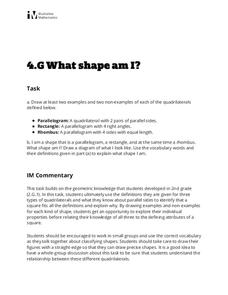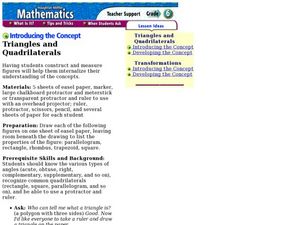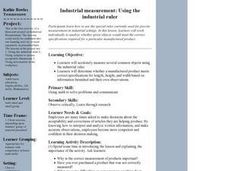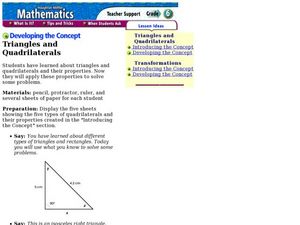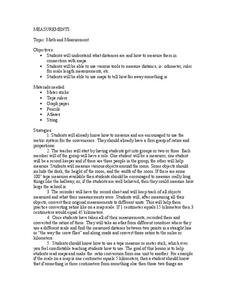Illustrative Mathematics
What Shape Am I?
Sharpen your pencil and grab a ruler, it's time to draw some quadrilaterals! Given the definition of a parallelogram, rectangle, and rhombus, learners draw examples and nonexamples of each figure. The three definitions are...
Mathed Up!
Negative Numbers
Individuals read tables with temperatures and times in order to distinguish the town with the lowest temperature or most extreme temperature difference. Each of the eight questions has three sub-questions that use the same charts.
Mathed Up!
Angles: Parallel Lines
Viewers are presented with seven problems with parallel lines and angle relationships and must use the given information to find the measures of specific angles. To finish, they explain their process in finding the measures in the...
Curated OER
Explore Learning Exponential Functions
High schoolers graph exponential equations and solve application problems using exponential functions. They re-enact a story about a peasant worker whose payment for services is rice grains doubled on a checker board. They place M &...
Curated OER
Exponential Functions
Students graph exponential equations of the form y=Ma. They understand the effects of M, a, and k on the graph. They solve application problems using exponential functions.
Curated OER
Point-Slope Form of a Line
This activity helps young mathematicians connect the graph and the point-slope form of a line, by first solving a real-world problem and then using that example to motivate the understanding of the equation. By manipulating the gizmo,...
Curated OER
Earth Science Regents: The Ellipse
Starting with the instructions to draw an ellipse, and with great pictures, this sheet should help your pupils learn the shapes and measurements involved. Using push pins and string, your class can discover the axis and focus points...
Curated OER
Logarithmic Functions
Learners explore the characteristics of logarithmic functions and their relationship to exponential functions. Using the subscriber website Explorelearning.com, pupils observe changes in the input variable and its effect on the graph of...
Curated OER
Just Me and My Shadow
Middle schoolers take measurements throughout the day using a simple sundial called a gnomon. They record the results on a Data Log and convert from English units to metric (S.I.) units. Data points are plotted on the same graph and...
Illustrative Mathematics
The Intersection of Two Lines
Here is an introduction to solving simultaneous linear equations. Start by drawing a line through two points. Create a second line which goes through the intersecting point. Background knowledge of how to find the equation of a line and...
Discovery Education
Sonar & Echolocation
A well-designed, comprehensive, and attractive slide show supports direct instruction on how sonar and echolocation work. Contained within the slides are links to interactive websites and instructions for using apps on a mobile device to...
Santa Monica College
Introducing Measurements in the Laboratory
We use basic units of measurement to break down things and communicate clearly. The first lesson in an 11-part series teaches the proper way to measure various items. It starts simply with measuring the dimensions and areas of geometric...
Cornell University
Non-Newtonian Fluids—How Slow Can You Go?
Children enjoy playing with silly putty, but it provides more than just fun. Young scientists make their own silly putty using different recipes. After a bit of fun, they test and graph the viscosity of each.
NOAA
Methane Hydrates – What's the Big Deal?
Have you ever tried to light ice on fire? With methane hydrate, you can do exactly that. The ice forms with methane inside so it looks like ice, but is able to burn. The lesson uses group research and a hands-on activity to help scholars...
Curated OER
Introducing the Concept: Proportions
Students measure distances. In this proportions lesson, students use a map to find how far it is between different cities. Students use their knowledge of measurement, multiplication and fractions to find the distances.
Houghton Mifflin Harcourt
Introducing the Concept: Triangles and Quadrilaterals
Guide your geometers through the process of constructing polygons. They learn how to draw triangles, squares, parallelograms, rectangles, rhombuses, and trapezoids with specified angles using a protractor and a ruler. The lesson plan...
Curated OER
Vector Lab
Here is a math lab that helps young mathematicians understand the real-life meaning for vector addition. By building a model using spring scales and washers as weight, and then calculating the vector addition using two different methods,...
Curated OER
Industrial Measurement: Using the Industrial Ruler
Students accurately measure several common objects using the industrial ruler. They work individually to analyze whether given objects would meet the correct specifications required for a particular manufactured product.
Houghton Mifflin Harcourt
Developing the Concept: Triangles and Quadrilaterals
Exact narrative and examples make this lesson on polygons easy to implement. Through it, your class will learn how to use a protractor and ruler to construct triangles and quadrilaterals according to your directions. Your class will be...
Curated OER
Introduction to Measuring Length in Customary Units
Students explore customary units of measurement. Students use yardsticks, rulers, and adding machine paper to measure specific units as directed by the teacher. Through completing this hands-on activity, they actively investigate units...
Curated OER
Math and Measurement
Students use the correct tool to measure distances. In this geometry instructional activity, students use an odometer and ruler correctly as they study maps. They describe how far way something is.
Curated OER
Measuring By Hand
In this measuring by hand worksheet, students first use a ruler to measure then use their cubit and thumbs to estimate lengths in inches and complete an 'analyze it' and 'explore' question.
Curated OER
Math is Everywhere: Part 2
Second graders identify shapes and measurements in everyday life. In this measurement lesson, 2nd graders locate rectangles in their classroom and use standard and nonstandard forms to measure them. Students view a video clip...
Illinois State Board of Education
Is It Linear?
Math apprentices are introduced to the components of a linear relationship. In groups, they write story problems that incorporate this relationship and relates to the real world. They give their problem to the class for them to solve.
